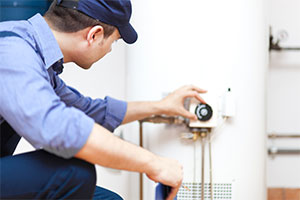Getting more from your propane water heater, Part 2 of 2
Posted: March 26, 2018
 In our last post, we talked about the five ways to cut your energy bills with your water heater. In this week’s post, we’ll focus on the last of those five – using less hot water – in more detail.
In our last post, we talked about the five ways to cut your energy bills with your water heater. In this week’s post, we’ll focus on the last of those five – using less hot water – in more detail.
Six ways to use less hot water
The average American household uses about 70 gallons of hot water every day (think about the storage tank on your water heater, then imagine one and a half or two of those …that’s a lot of water to heat!).
The total adds up quickly – look at these common tasks and their hot water usage:
- Laundry (medium) – 25-30 gallons
- Shower (5 minutes) – 10+ gallons
- Dishwasher (average) – 6 gallons
- Kitchen / bathroom faucet – 2 gallons / minute
If you want to reduce the amount of hot water you use in these and other common tasks, here are six simple ways to do it:
- Fix Leaks – You can significantly reduce hot water use by simply repairing leaks in faucets, showerheads, and pipes. A one-drip-per-second leak wastes 1,661 gallons of water and can cost up to $35 per year, according to the US Department of Energy.
- Install low-flow showerheads – Up until 1994, shower heads had a standard flow rate of 5.5 gallons per minute (gpm). Since 1994, that flowrate has been reduced to a maximum of 2.5 gallons per minute (some go as low as half that). If your showerheads predate 1994, you can purchase a quality low-flow replacement for under $20 and cut your hot water usage by 25-50 percent.
- Replace your faucet aerators –The aerator (the screened, screw-on tip at the end of your faucet) determines how quickly water will flow from your faucet. Most modern kitchen faucets have aerators that restrict flow rates to 2.2 gallons per minute (gpm), while new bathroom faucets have ones that restrict flow rates from 1.5 to 0.5 gpm. Aerators take less than five minutes to replace, and by swapping your 2.2 gpm with a 1.0 gpm model you’ll cut your hot water consumption in half. Just bring the aerator you’re replacing to the store so you know you’re getting the right-sized replacement.
- Use the cold water setting for clothes washing – Most of today’s detergents work perfectly well in any water setting. If you still feel you need to use hot or warm water, make sure you choose the right load setting for the amount of clothes you’re washing.
- Buy energy efficient appliances – Efficient dishwashers and clothes washers will significantly cut your energy bills. Check the EnergyGuide label to see how much energy your appliance uses, but make sure you compare apples to apples: although a “compact capacity” dishwasher may have a higher efficiency rating than a “standard capacity” dishwasher, for example, it also holds fewer dishes – which means you have to use it more often (the same principle applies to clothing washers). If you want to ensure that your new appliance is energy efficient, buy one with an ENERGY STAR®
- Consider a tankless water heater –A big part of the energy cost associated with hot water comes from RE-heating it – a flaw inherent in water heaters that use a storage tank (your water stays in the tank – usually in a cold basement – where it needs to be continually re-heated until it’s used). A tankless propane water heater, on the other hand, heats water instantly on demand, so you only pay to heat the water you need. It also has no pilot light, so you won’t pay to pay for that gas, either.
The bottom line: It’s easy to cut down on hot water use without sacrificing your comfort or quality of life at home. Follow these tips and you’ll find your energy bills shrinking month after month!
How many gallons of water do you think showering alone can take? Here’s some info
On average, a conventional shower head emits approximately 2.5 gallons of water per minute, which means that a 10-minute shower can consume around 25 gallons of water. However, the actual amount may vary widely depending on the showerhead, user behavior, and the duration of the shower. Water usage can be effectively reduced by installing a low-flow showerhead, which usually releases less than 2 gallons of water per minute. Besides, mindful habits, such as limiting shower time and turning off the water while soaping or shampooing, can also contribute significantly to conserving water. These changes not only preserve a vital resource but also result in substantial savings on water bills over time.
Considering a water heater upgrade? We can help! Contact us today to get a FREE, no obligation estimate on a conventional or high-efficiency tankless propane water heater for your North Carolina home!
 In our last post, we talked about the five ways to cut your energy bills with your water heater. In this week’s post, we’ll focus on the last of those five – using less hot water – in more detail.
In our last post, we talked about the five ways to cut your energy bills with your water heater. In this week’s post, we’ll focus on the last of those five – using less hot water – in more detail.